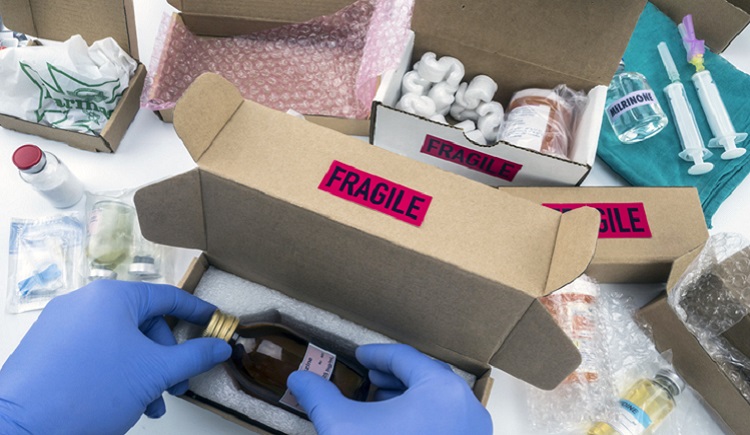As is the case with any chain, a clinical trial supply chain is only as reliable as its weakest link. For planning and execution to be effective, the process of planning the supply chain must be intelligently crafted and guarded against risk and mistakes.
Outsourcing-Pharma (OSP) asked Andrew Thress, Almac’s project group manager for supply chain management, about what marks clinical research teams need to hit in order to ensure a smooth-running trial supply chain.
OSP What are the key questions a clinical research team should ask at the onset of trial planning, to ensure their trial supply chain is well built and everything runs smoothly?
AT: The clinical supply managers must consider a number of factors when building a trial to maximize efficiency and reduce risk— starting with determining the intended patient population. It is crucial for teams to pinpoint, very early on, who will make up the participant group and what countries will be involved, given that these factors will reveal if there are sensitivities to consider, and any roadblocks that may correlate when trying to recruit patients.
After narrowing down the target population and countries, the research team will need to zero in on international trade related factors—for example, whether there are any regulatory or import/export constraints for the countries involved, or if any challenges are anticipated with commercial drug procurement.
On a more granular, but incredibly important level, the clinical supply managers must also consider study design and logistics from the onset of planning. What will the supply strategy be, given the population?
For instance, consider if the trial seeks to engage a patient population in a highly remote area. That would be an example of a population-specific sensitivity that would need to be addressed when building the patient supply strategy.
In this scenario, a bespoke direct-to-patient approach may be chosen, over more traditional site-based strategy, in order to ensure that the patient can get access to the drug in a timely manner. Overlooking these factors would have a considerable impact on the efficiency, continuity, and success of the trial.
OSP: Can you share any common mistakes or misconceptions CROs, sponsors and other stakeholders might have, regarding trial supply chain setup/management?
AT: Failing to weave in the supply chain function early in the study planning process is a common mistake I often see from clinical research teams. By engaging the supply chain team late, there is a level of “playing catchup” that must take place with critical activities related to drug manufacture, procurement, and Interactive Response Technology (IRT) set-up.
To avoid any slowdowns in the start-up for a global program, I recommend that the supply chain team gets engaged at least 6 months prior to the first in-patient date.
It is important that all stakeholders work together, share perspectives and understand their role in establishing an effective supply chain. There is a critical link between patient recruitment forecasts developed by the clinical team, and drug forecasts developed by the Clinical supply managers.
Clear, timely and streamlined communication pathways are key to a successful collaboration.
OSP: Are there any areas that trial professionals frequently fail to consider or plan for?
AT: Trial professionals often underestimate the amount of time it takes to start up a trial in different countries, when a sponsor chooses to expand. Unfortunately, not planning for these possible slowdowns can derail the sponsor’s expected timeframe, as getting through the regulatory hurdles of any country can take a considerable amount of time; for example, Brazil and China have particularly restrictive regulatory frameworks and lengthy approval processes.
OSP: What steps should they take to help guard their trial against risk?
AT: To manage risk, sponsors should not be dependent on a “single leg” supply chain and should look to diversify their manufacturing and procurement activities across multiple suppliers and sites. For example, the COVID-19 pandemic has shed a light on the reason why drug manufacturing should not be done exclusively in one country. Countless supply chains were severely disrupted this year by for companies who relied on operations in China exclusively to meet their manufacturing needs.
When feasible, sponsors should run smaller, more frequent batches of product to limit batch failure during a trial. Having the foresight to maximize decisions upfront also helps eliminate last minute costs and disruptions – for example, if a sponsor is planning for a multi-country trial, include all potential countries in the booklet label from the beginning to eliminate rework.
OSP: Can you share ways in which trial teams can harness technology solutions to help streamline their supply chain management?
AT: IRT systems provide clinical trials with essential software services to manage patient enrolment, randomization, inventory management, and study drug assignment. The system is used to manage patient interactions and drug supplies during clinical trials, and perform a range of essential functions for sponsors, drug depots, and investigative sites.
It’s critically important to select an IRT system that integrates with your CMO vendor to ensure optimized order and shipment processing, as well as with the Electronic Data Capture (EDC) system for capturing clinical trial data.
Material resource planning (MRP) technology also enables the optimization of production and distribution strategies for efficient clinical supply management. SupplyWise – Almac’s MRP/forecasting tool—calculates clinical supply demand over time, drives production and capacity planning, and feeds in real-time inventory and patient enrolment data provided through the IRT; having a system like SupplyWise provides timely information to guide smart clinical supply chain decisions.
At Almac, we’ve also seen significant benefit from rolling a number of these functions together into one robust, cross-functional product, which we call Almac ONE. The tool combines leading technology applications: IRT + ERP + Temperature Management + Forecasting (SupplyWise) to securely and accurately collect and share pre-validated data; this enables sponsors to streamline their studies providing a unified view of data and achieves the goal of creating optimized, efficient and patient-focused clinical supply operations.
OSP: How do you feel the clinical trial industry likely will evolve in the next several years, and how can clinical trial supply chain management and planning professionals think ahead, to anticipate and help meet such needs?
AT: Moving into the future of clinical supply, we expect to see patient centricity continue as the prevailing factor of what makes a clinical trial solution successful. Since the start of the pandemic, Almac has seen a rise in decentralized trials and direct to patient solutions, both of which have provided sponsors the ability to be agile and maintain continuity during uncertain times.
In terms of technology, we anticipate seeing an increased use of electronic labels and smart technology, and the ability to track and trace drugs from one’s smart phone. For example, using an RFID chip embedded in the patient pack or label could allow a patient to use a smart phone app to read the label translated in his or her own language and with their country specific requirements.
For the sponsor, electronic labels or e-labels could provide rapid access to up-to-date information, significantly reduce deviations, and increase operational efficiencies.
Lastly, the increase in precision and personalized medicine will continue to impact the clinical trial industry. Clinical supply chain professions must adapt to this change by adopting transformative supply chain operations and strategies to ensure that expensive, temperature sensitive IMP is managed with no waste.
OSP: Could you please provide the ‘elevator presentation’ description of the clinical trial supply chain management services Almac offers?
AT: As innovators of the supply chain management (SCM) service offering, Almac has over 30 years of experience with multiple trial designs, phases and therapeutic indications. Our SCM experts have the ability to anticipate supply chain needs, challenges and opportunities based on prior experience.
Using innovative technology solutions, dedicated SCMs draw on Almac’s collective experience to manage clinical supply chain activities, ensuring the most efficient use of available drug supply, without ever losing focus on the patient.
The service offering is flexible and completely customizable to meet your needs and compliment or enhance your current capabilities. Services include; Forecast and Simulation, Inventory Management, IRT Medication Management, Label Development and Regulatory Vetting, Temperature Services, Investigator Initiated Trials and Specialized Clinical Programs, and Pharmacy Services.



